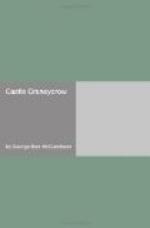“Shall we walk awhile and then find a cafe where we may have something to drink?” asked the duke, his English so imperfect that no writer could reproduce it.
“I am in your hands, and at your mercy,” said the other, clinging close to him as they merged into the crowd.
“May I ask if you have many friends in Brussels?” Under the politeness of the inquiry Quentin, with amusement, saw the real interest. Looking calmly into the Italian’s beady eyes, he said:
“I know but four persons here, and you are included in the list. My servant is another. Mrs. and Miss Garrison are old and particular friends, you know. In fact, my dear duke, I don’t believe I should have come to Brussels at all were they not here.”
“They are most charming and agreeable,” murmured the duke. “This is such a frightful crowd Shall we not cross to the other side?”
“What’s the use? I used to play football—you don’t know what that is, I suppose—and I’ll show you how to get through a mob. Get in front—that’s right—and I’ll bring up in the rear.” Laughing to himself, he brought his big frame up against the little man’s back and surged forward. Sure enough, they went “through the mob,” but the duke was the volley end of the battering ram. Never in all his life had he made such hurried and seemingly unnecessary progress through a blockading crowd of roisterers. When they finally went lunging into the half-deserted Rue de la Madeleine, his silk hat was awry, his composure was ruffled, and he was very much out of breath. Phil, supremely at ease, heaved a sigh of satisfaction, drawing from the Italian a half-angry, half-admiring glance.
“Much easier than I thought,” said Quentin, puffing quietly at his cigar.
“We did it very nicely,” agreed the other, with a brave effort to equal the American’s unconcern. Nevertheless, he said to himself many times before they reached the broad Boulevard Anspach, that never had he taken such “a stroll,” and never had he known how little difference there was between a steam and a human propeller. He almost forgot, as they sat at a small, table in front of a cafe, to institute his diplomatic search for the real object of the American’s presence in Brussels.
It was twelve o’clock when they returned to the hotel, after a rather picturesque evening in the gay cafes.
Here is what the keen little Italian deduced: Quentin was to remain in Brussels until he took a notion to go somewhere else; Quentin had seen the prince driving on the Paris boulevards; the Bois de la Cambre offers every attraction to a man who enjoys driving; the American slept with a revolver near his pillow, and his manservant had killed six or seven men in the United States because of his marvellous skill with the pistol; Quentin was a most unsophisticated young man, with honesty and innocence in his frank eyes, although they sometimes grew rather searching; he could only be overcome by cunning; he was in love with Miss Garrison.




